Jaws author Peter Benchley once stated in an interview that “every young man in the world is fascinated with either sharks or dinosaurs”. With that in mind, you would think that the sharks that lived alongside the dinosaurs would be doubly fascinating. Alas, prehistoric sharks in general don’t receive much interest or fascination. Maybe it’s because sharks are still here, and the extant species are captivating enough in their own right. It could also be because the prehistoric seas were also home to gigantic marine reptiles that outshine their cartilaginous contemporaries. Whatever the case, our hobby has suffered for it. When a mainstream company does make a prehistoric shark it’s almost always a decidedly boring O. megalodon that’s made to look like an extant great white shark.
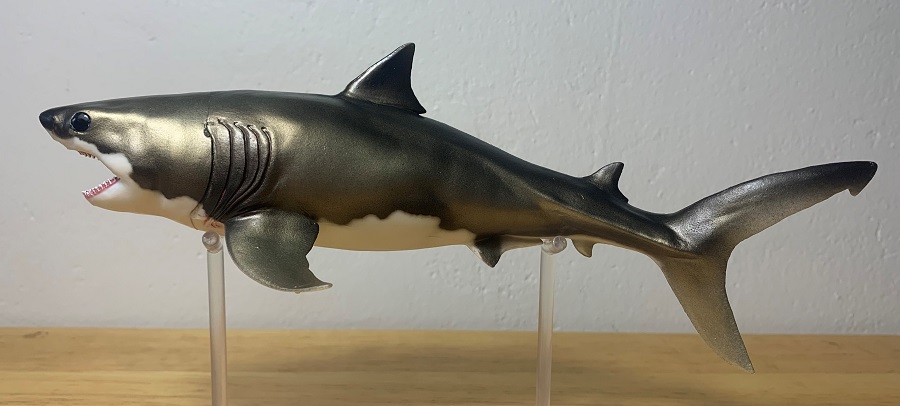
But as I said in my CollectA Xiphactinus review, 2021 was a good year for prehistoric fish figures, and at that time the subject of today’s release wasn’t even announced yet. There was one more fishy surprise left in store for 2021, the PNSO Cretoxyrhina, part of their Prehistoric Animal Model range.
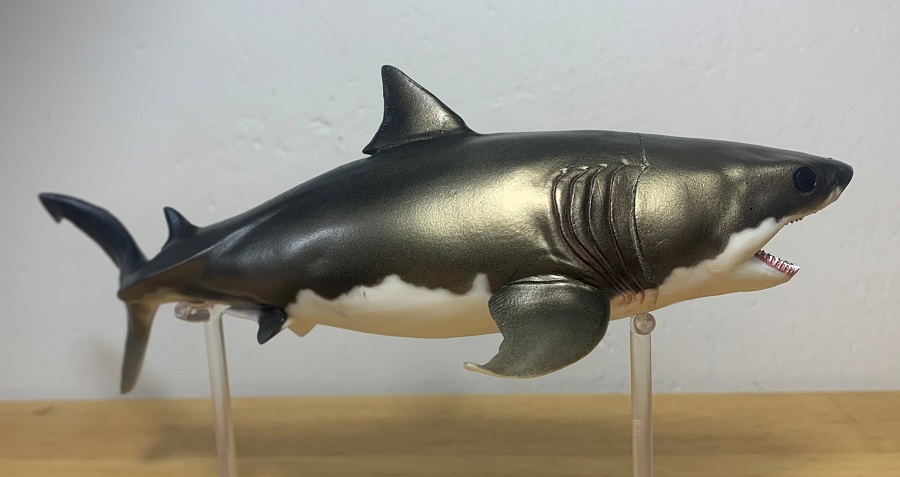
Cretoxyrhina was a member of the mackerel shark order, the Lamniformes. This diverse order persists to this day with notable members including the great white, basking, thresher, sandtiger, and goblin shark, among others. The Cretoxyrhina genus lived during the late Cretaceous and its fossils have been found around the world. The type species, Cretoxyrhina mantelli, lived in the famous Western Interior Seaway, part of which is now the Niobrara Formation in Kansas, U.S.A, which has yielded the best fossils of the species.
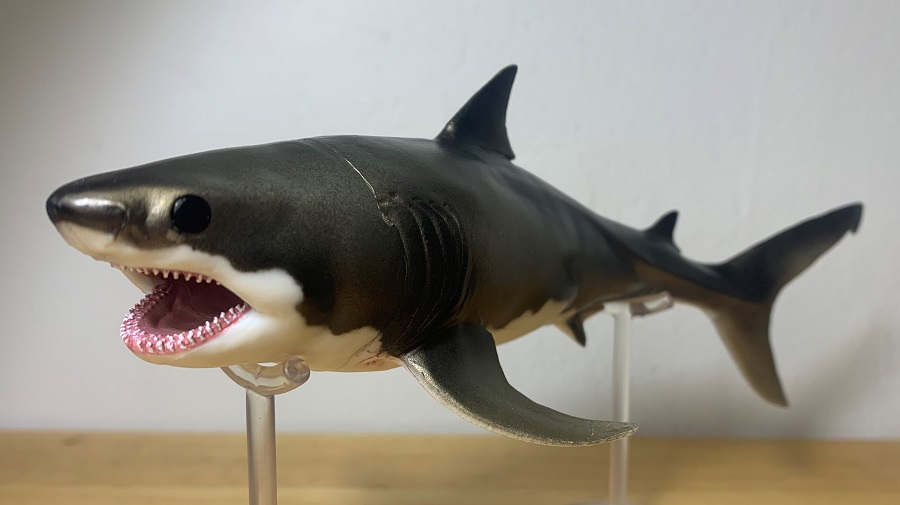
Also known as the Ginsu shark, C. mantelli would have lived alongside such well-known prehistoric animals as Tylosaurus, Dolichorhynchops, Xiphactinus, and Pteranodon. C. mantelli would have been comparable to a large white shark in size, 20’ (6 meters) or perhaps larger. This would have made it an apex predator in its time, despite living with a diverse assemblage of other apex predators. Tooth marks and stomach contents indicate that Cretoxyrhina fed on mosasaurs and other marine reptiles, Xiphactinus, and even Pteranodon. It would have also fed on a wide variety of bony fishes, turtles, and other sharks.
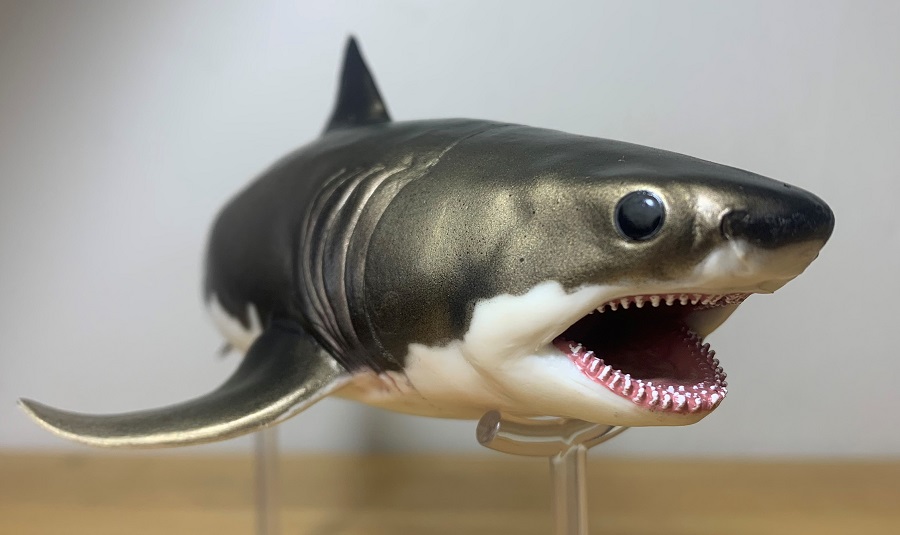
With all that background information out of the way it’s time to look at Aidan the Cretoxyrhina, the first serious attempt to portray this well-known prehistoric shark. Measured down the back and along its curves, from snout to the end of his tail, Aidan measures 8” (20 cm). If scaled down from a 20’ (6 meter) specimen that would make Aidan 1/30 in scale.
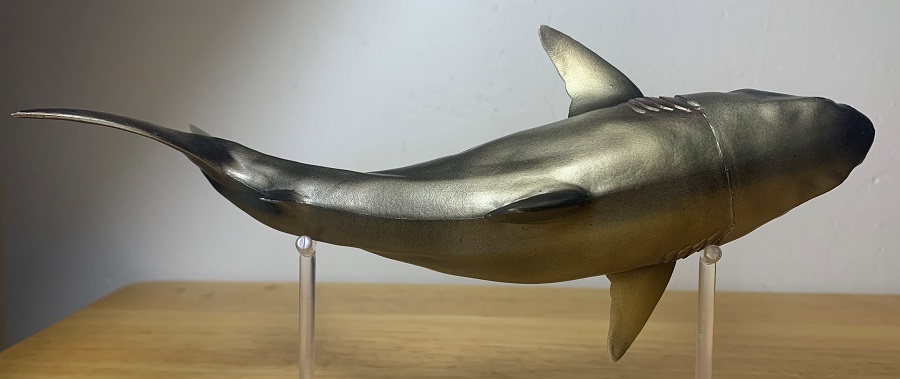
At a glance, Aidan looks very much like a white shark, and this may disappoint some collectors who have grown weary of the white shark copycat O. megalodon figures. But if you look closer and compare it to a white shark, you’ll notice some significant differences. Aidan’s head is wide and flat, but has a shorter, blunter snout than a white shark does, and his eyes are proportionately larger too. To me, this makes Aidan look more like a salmon or porbeagle shark than a white shark.
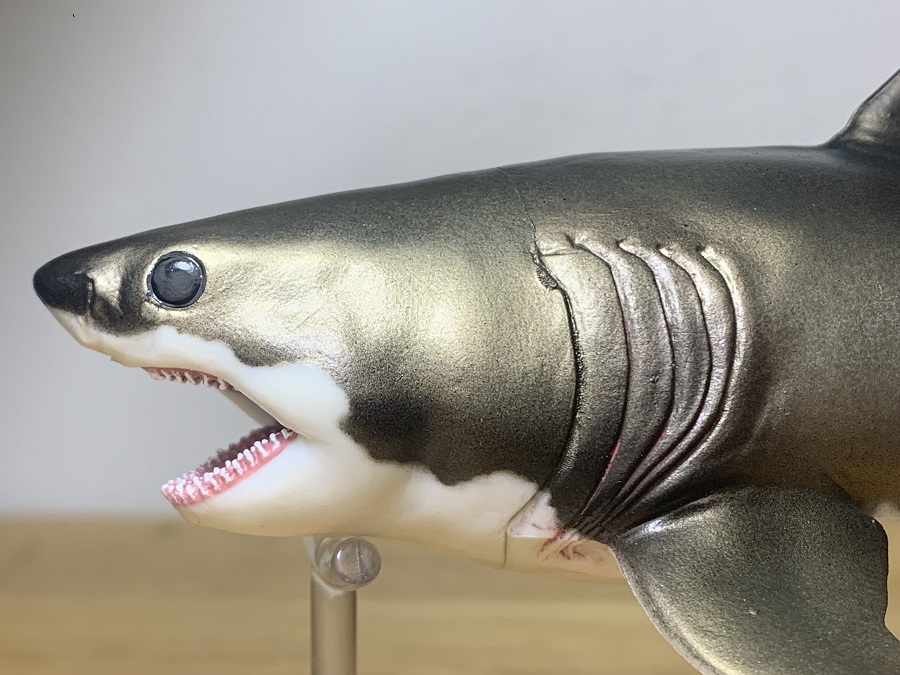
Keep in mind that Aidan’s skull is not speculative, like it would be for a megalodon. We actually have some excellent preserved remains of Cretoxyrhina, illustrations of which are included in the booklet that comes with Aidan. Such remains are rarely preserved in the case of sharks, due to their cartilaginous skeletons. For megalodon all we have are teeth and maybe some isolated vertebrae. For Cretoxyrhina we have articulated skeletons composed of the skull, teeth, gills, scales, pectoral girdle, fins, vertebral column, and stomach contents. It’s truly remarkable, and that’s why a figure like Aidan excites me more than one of megalodon, even if they both resemble a white shark. This one is at least based off of something substantial.
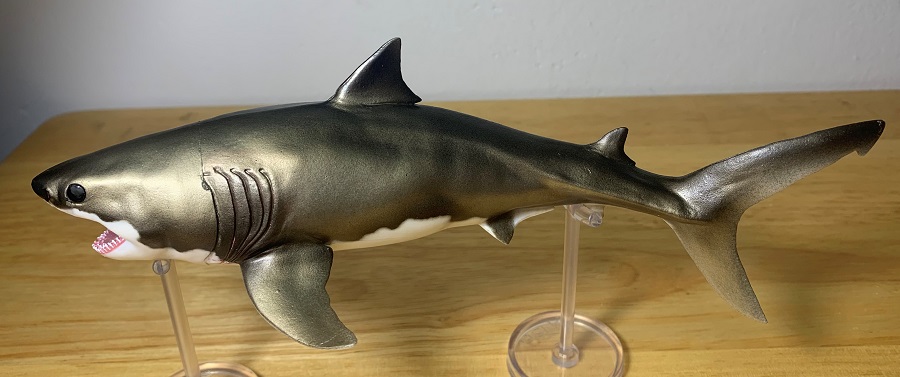
Past the head Aidan’s body has the typical shark body plan that is indeed reminiscent of a white shark but given its ecological niche is likely accurate. Five elongated gill slits are sculpted between the head and pectoral fins. The body is wide and robust, with a relatively small dorsal fin, proportionally smaller than what you would see on a white shark.
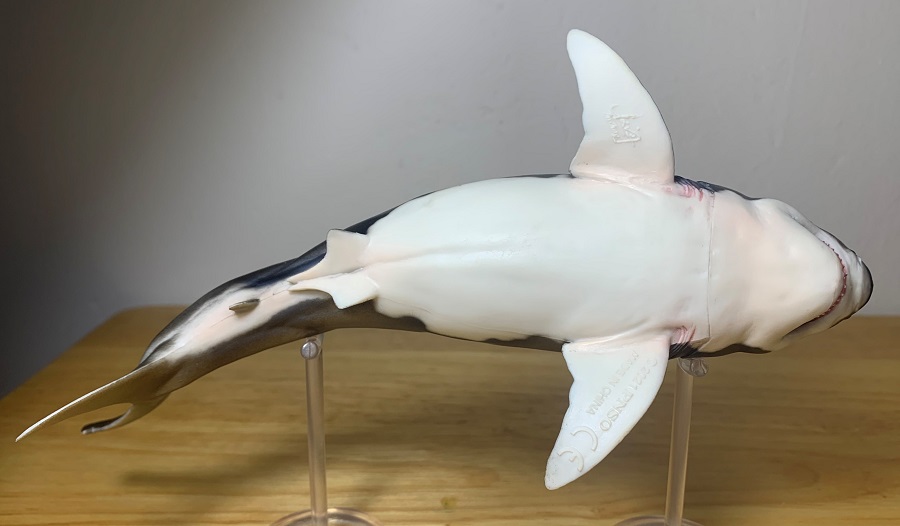
Claspers on the pelvic fins confirms that Aidan is indeed a male shark. Aidan’s tail is strongly keeled with lobes of almost equal length, similar not only to a white shark but a great many other fishes as well, an adaptation for fast swimming in open water environments.
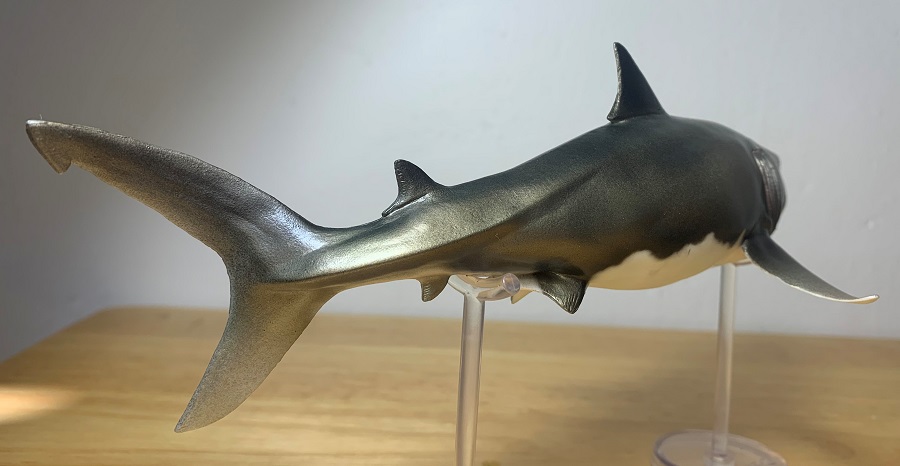
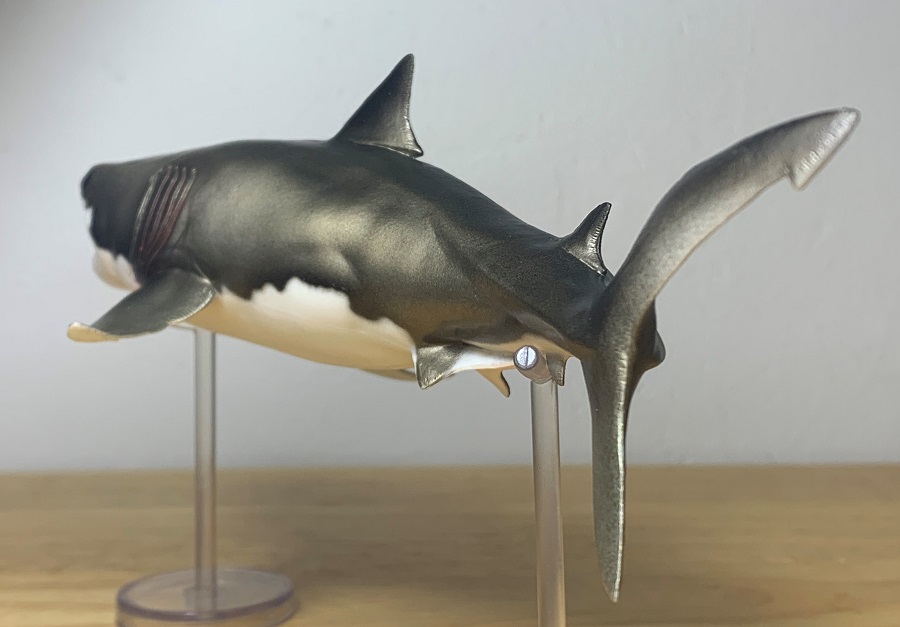
Two rows of teeth are sculpted in Aidan’s upper jaw, and three rows are present on the bottom. Details in general are sparse but that’s appropriate for a shark. There are small creases and folds sculpted where applicable, like where the fins meet the body. Small striations are etched along the rear edges of the fins, these represent the strands of protein known as ceratotrichia that supports the fins themselves.
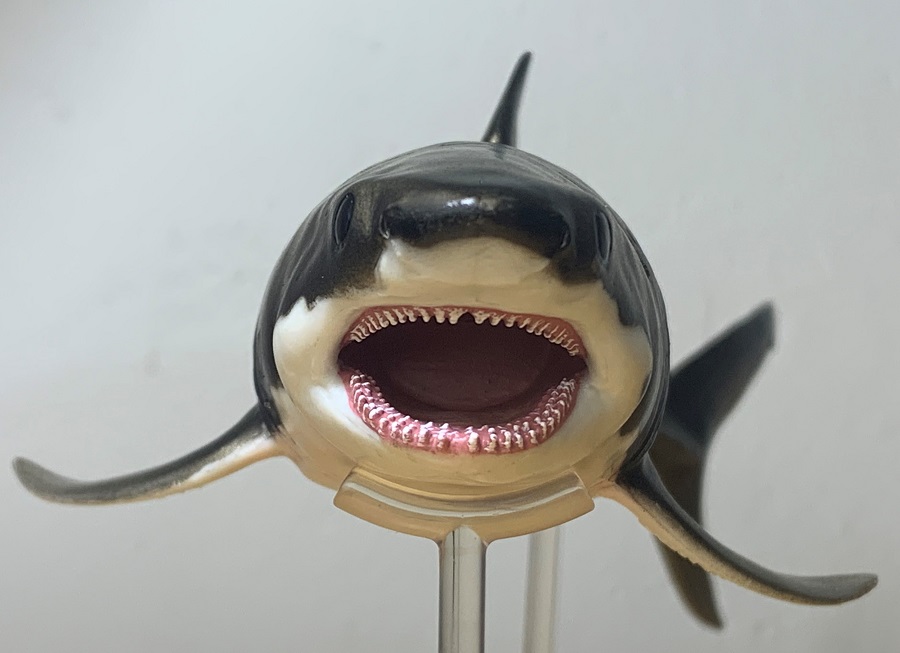
Aidan’s coloration is composed of dark gray and white. Dark coloration dorsally would help to conceal the animal from above while light coloration ventrally serves to conceal the animal when viewed from below, this is known as countershading.
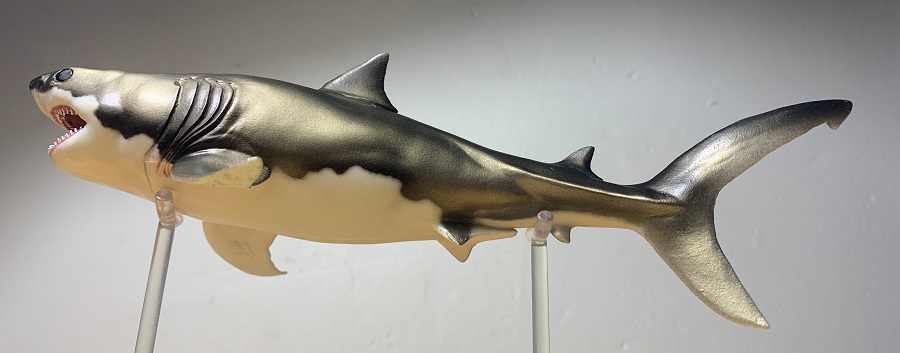
In Aidan these dark and light tones are sharply contrasted and divided, and this is what makes Aidan look so much like a white shark as it’s virtually identical to what we see in that species. Did Cretoxyrhina possess such coloration? Perhaps, but there are a lot of sharks and other pelagic predators that posses’ countershading without such a sharp contrast and divide between the light and dark. It’s iconic in the white shark for a reason. It’s not an unlikely color scheme but perhaps a little too inspired.
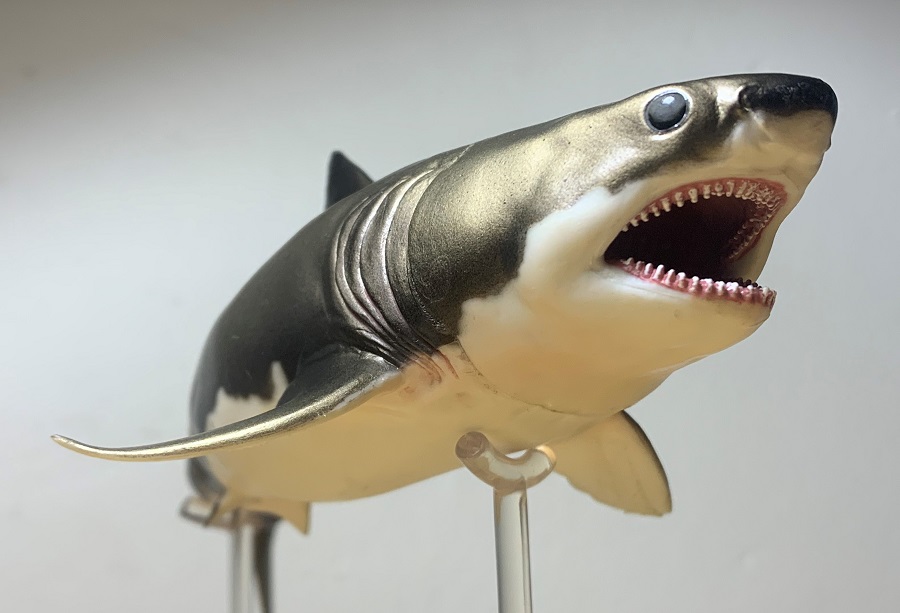
The dark gray portions of Aidan have a shiny metallic, almost gold, sheen to them that’s quite pleasing and helps to hide his visible seam that we’ll address shortly. Aidan has big, black eyes, like a doll’s eyes, and the inside of his mouth is pink. The miniscule teeth are painted white, and the paint is exceptionally well applied here. The area around the bottom of his gill slits has a faint pink color around them.
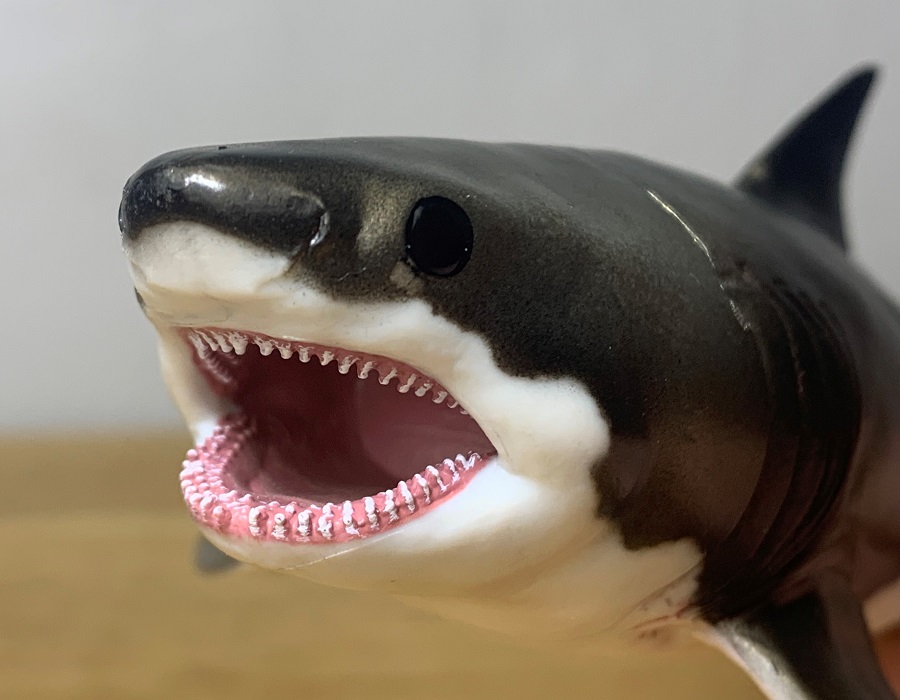
Now it’s time to talk about those seams. Aidan is a hollow figure with a visible seam line that runs completely around his head, much like the wave of marine reptiles and the Livyatan that PNSO recently released. In this instance the seams really aren’t much of a problem, thankfully. The gill slits obscure the seams along the sides and the seam on his back is mostly obscured by that metallic paintjob I mentioned, especially when viewed from afar. The only place where it’s obnoxiously obvious is on Aidan’s underside but that’s not a part of the body you’ll likely see when he’s on display. Since Aidan is in the $20 price bracket, I can’t judge the seam as harshly as I might on a figure with a price tag twice as high.
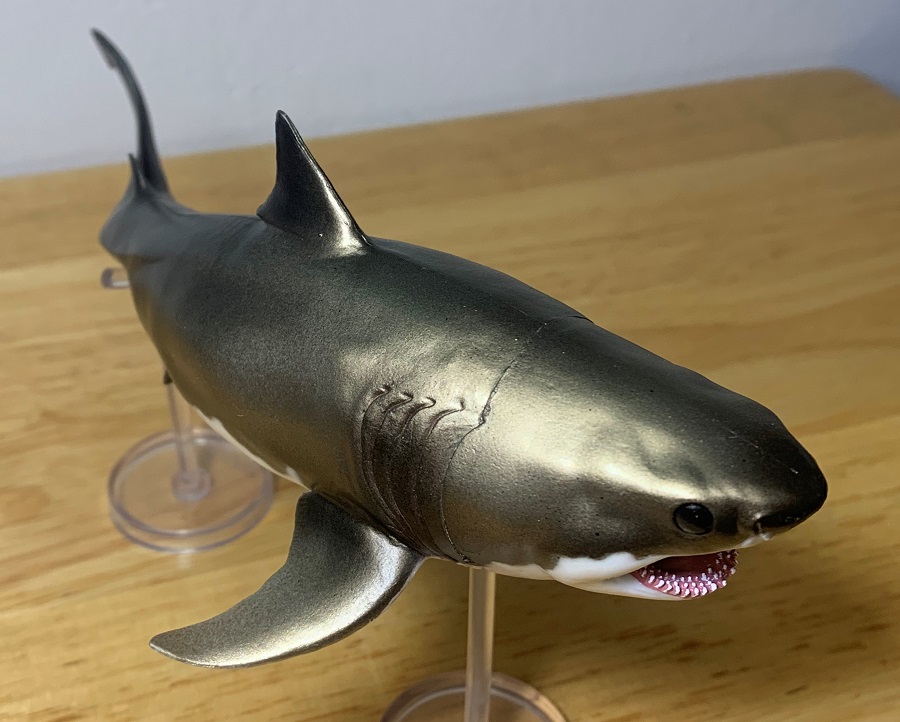
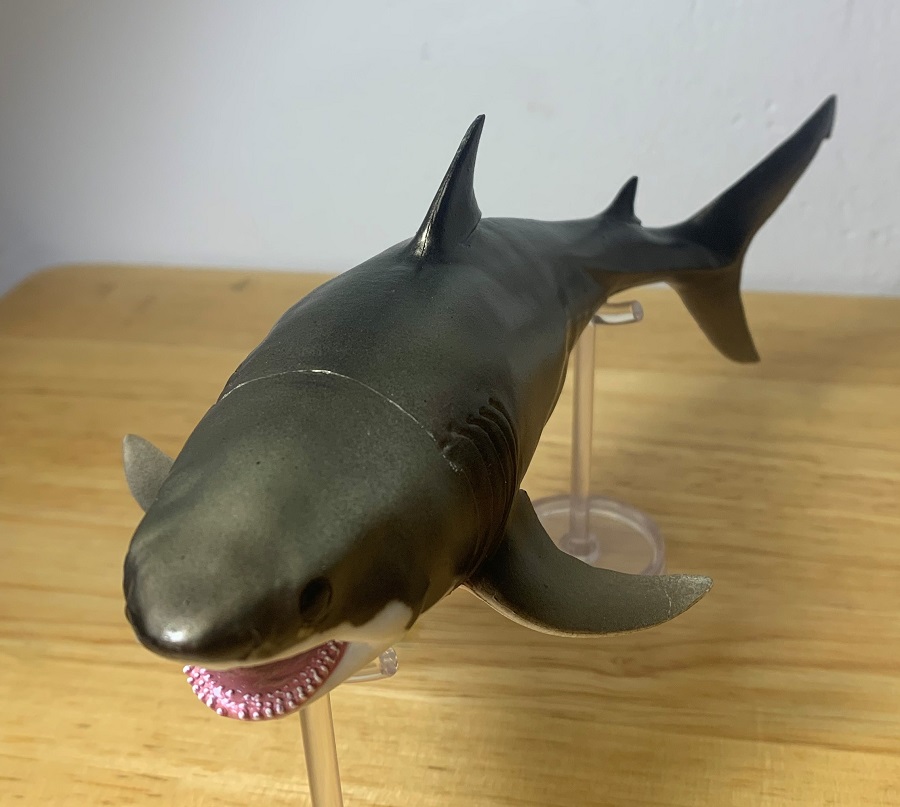
Any reader here that also reads the Animal Toy Blog will know that I also enjoy collecting and reviewing sharks, so you shouldn’t take it lightly when I say that Aidan is perhaps the best shark in my entire collection, extinct or extant. It seems like the release of Aidan was regarded with little fanfare; he was written off as just being another great white toy with a different name attached. That’s not the case, Aidan resembles a great white in coloration, that much is obvious, but he is anatomically distinct from a great white and faithful to the fossil remains we have for this species. If you collect prehistoric fishes, do not take this Cretoxyrhina for granted.
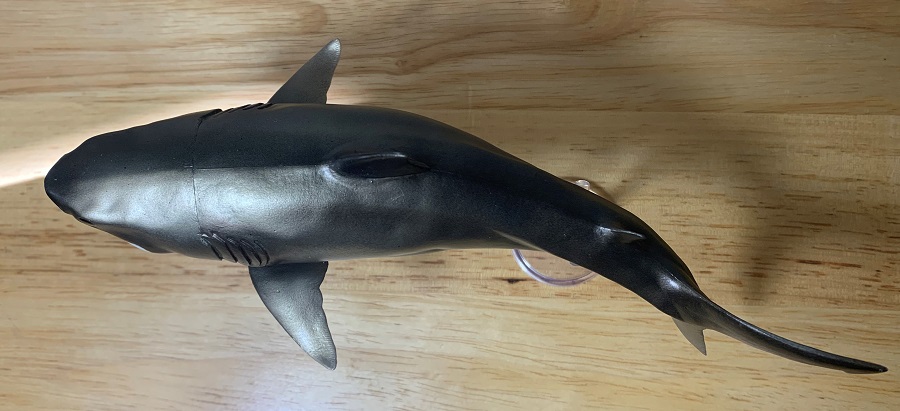
Praise aside, it is surprising that PNSO would choose this species over the dozens of bizarre and anatomically unique extinct sharks that are unlike anything alive today. Hopefully PNSO will tackle some of those in time, and I certainly wouldn’t mind it if they did a few extant species as well. Aidan the Cretoxyrhina is currently available online for about $23.
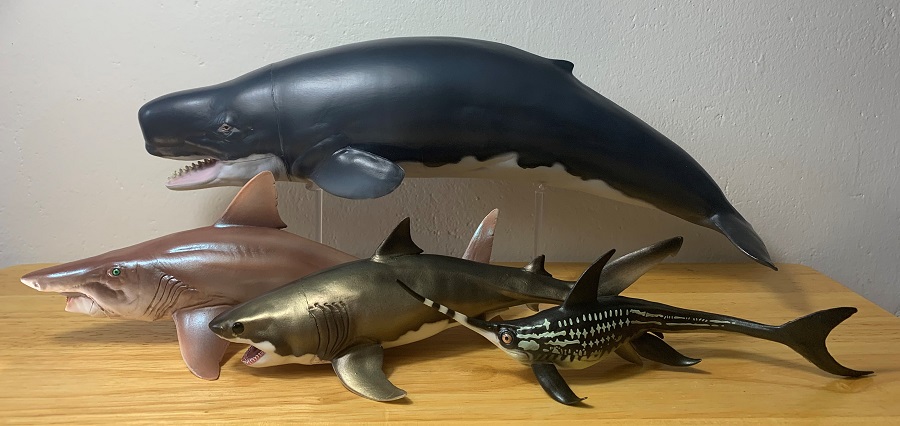
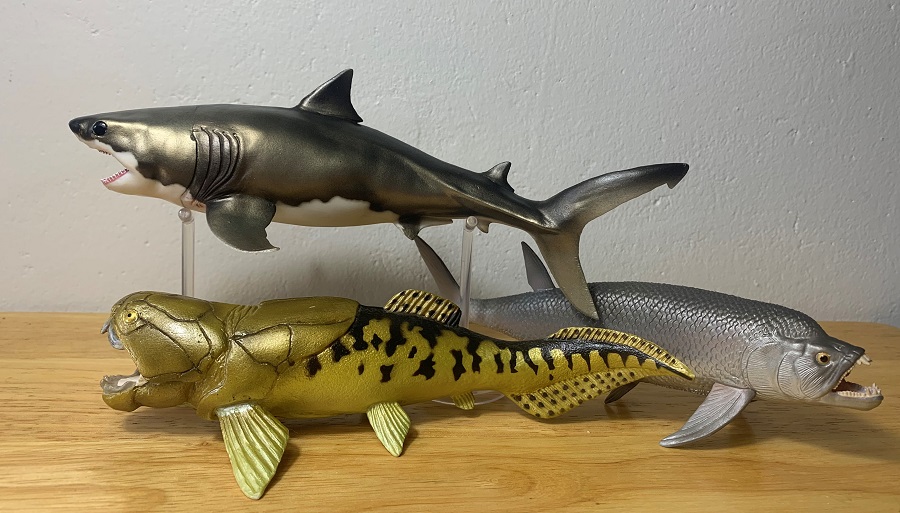
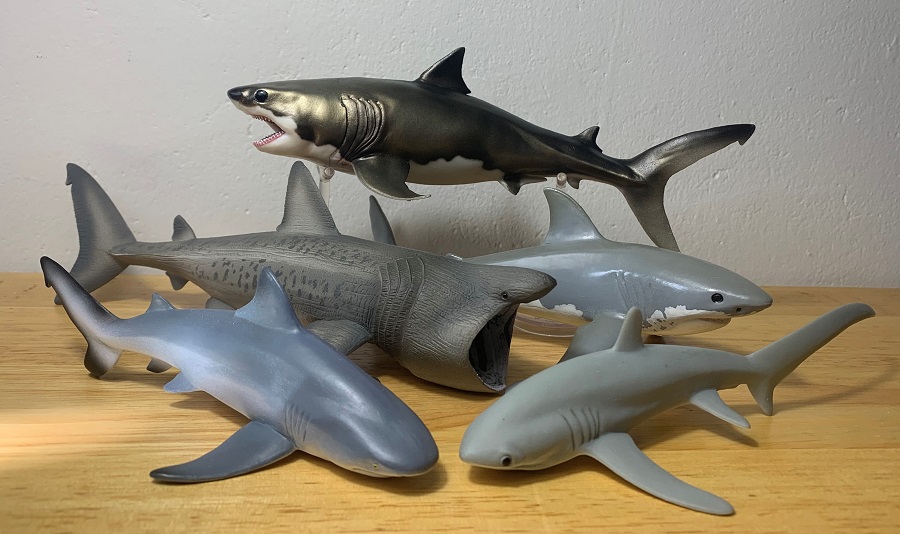
Disclaimer: links to Ebay and Amazon on the DinoToyBlog are affiliate links, so we make a small commission if you use them. Thanks for supporting us!





Extensive review of PNSO’s cretoxyrhina, it is perhaps the best prehistoric shark made by the brand this past year. It’s honestly also one of their best prehistoric sea creatures made this past year. It is good that PNSO makes figures of prehistoric animals little known in the toy dinosaur market to a larger size than what we are used to with toy dinosaur brands, for example Safari, whose prehistoric shark figures are very good but with undersized because it is educational toob.
Nice review! I’m very grateful PNSO opted for another underrated species for their roster, and at the lower end of their price range while maintaining excellent quality.
I do wish PNSO had included a small stand for Aidan, since the model doesn’t rest flat due to the tail fin. What stands are you using for these photos?
Thanks! The stand that I’m using are the ones that came with the Livyatan, I just used them for photography purposes. I should probably write in the review that Aidan doesn’t come with his own stand.
Wonderful review of a wonderful figure. It sits on my shelves as well. I really like it, and your thorough review and great pics do it justice!
Thank you!
Great review, very thorough! I agree, while the coloration is reminiscent of a great white, the morphology and proportions make it immediately obvious that it’s something different. In a way I’m glad that PNSO made a meg early on, though I didn’t buy it; I think they learned from it and this Cretoxyrhina is better for it. It would be fine with me if they made a couple of prehistoric fish every year!
Thanks! I agree, this shark is a major step up from the megalodon. I don’t have the meg, or any meg, that’s one prehistoric fish I don’t feel too compelled to get.
This is a great review of a figure of a well-preserved prehistoric shark. I’m glad we got a new Cretoxyrhina as the most recent prior to this is from a retired tube set that came out over ten years ago.
This is a minor nitpick, but the figure’s name is Aidan, not Aiden.
Thank you! And that’s not a minor nitpick at all, thanks for pointing it out. I’ve gone through and made corrections. Much appreciated.
Definitely PNSO’s best shark of the three so far.